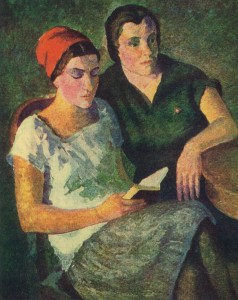Into the Whirlwind

TRANSLATED BY PAUL STEVENSON AND MANYA HARARI
AFTERWORD BY RODRIC BRAITHWAITE
344pp
ISBN 9781903155967
Twenty-five years ago, in the spring of 1989, a play was put on at Moscow’s Sovremennik theatre. It was based on Into the Whirlwind(1967), now Persephone Book No. 106, Eugenia Ginzburg’s memoir of Stalin’s Terror. In the foyer of the theatre was a golden statue of the man himself. And, writes Sir Rodric Braithwaite, former ambassador to Moscow and author of the new Persephone Afterword: ‘Through loudspeakers the Leader was commanding the Soviet people to vote in the election which he had just called. It was as if we were still on the eve of the Great Purge which had started in 1937.’ The play was about Eugenia Ginzburg’s arrest, her interrogation and the first two years of her imprisonment. ‘As the scenes succeeded one another, most of the audience was a in a state of stunned silence, frozen in grief.’ But, as we are told by the authors of 500 Great Books by Women, who also refer to the stage version in their description of Into the Whirlwind, ‘when the curtain came down an emotional audience rose up and applauded for twenty-four minutes. The tragedy of an entire nation had finally been dramatised in one woman’s poignant account.’
A teacher and Communist Party activist, Eugenia Ginzburg was married to the mayor of Kazan. In the book, and in the 2009 film starring Emily Watson, the perfectly ‘normal’, bourgeois, seemingly stable nature of her life is heartrendingly portrayed. But when a university colleague is arrested for alleged Trotskyist activities, the 30 year-old Eugenia is charged with not having denounced him. Soon she is expelled from the Party and interrogated; however, in 1937 she was imprisoned. Later she was sent to Kolyma, an enormous complex of labour camps in the Russian Far East. She always hoped to write about her experiences one day and seems to have had total recall. In the most beautiful prose (the translators were Paul Stevenson and the renowned Manya Harari, who translated Dr Zhivago) Eugenia Ginzburg records her shock at being arrested, the unremitting cruelty of the ‘authorities’ and the agony of being in custody, forced labour and exile. She describes friends who helped orphaned children, prison guards who were sometimes kind but mostly cruel, reciting poetry in the freight cars (reminding us of Etty Hillesum, whose last postcard said ‘we left the camp singing’), felling trees at fifty degrees below zero. And yet through all this suffering she gained a deep insight into what it meant to be human. It is impossible not to cry when reading this book – which means it is not for the faint-hearted – yet it is not merely a historical document: the dialogue is lifelike and everything is portrayed with extraordinary realism.
Into the Whirlwind should have a place next to other classics such as Akhmatova’s Requiem and Madelstam’s Hope against Hope. And, as Barbara Evans Clements has written in her recent A History of Women in Russia, these three writers ‘did not participate directly in the dissident movement, but their works played an important part in the building criticism of the Soviet system. The quality of their writing also places them among the major authors of twentieth century Russian literature.’ In 1967 a reviewer in The Economist wrote: ‘Here we have an intelligent eye-witness’s account of the most terrible period of Soviet history. Eugenia Ginzburg owed her survival to her strong constitution, her youth, and her extraordinarily rich inner intellectual life. She kept her sanity in the rat-infested, cold and filthy punishment cell by reciting poetry to herself, day and night. Her warmhearted interest in other people, her discerning eye, and the beauty of the language make this book a monument to the memory of the thousands of victims who perished in those decades when the gods of revolution were athirst.’
Endpaper
‘The Five Year Plan in Four Years’, a 1930 Russian textile by an unknown designer
Read reviews about all Persephone books
Read blogs about all Persephone books
Categories: Abroad Biography Politics Translations
